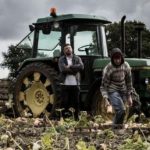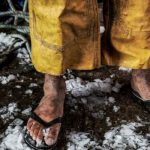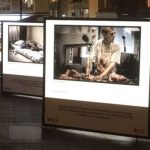BBC: Human trafficking: Modern-day slaves ‘within plain sight’
By Gwyneth Rees, BBC Wales News
The rugged landscape of north Wales is not a place usually associated with modern-day slavery.
Yet for some victims, its remote location has become a refuge.
Sophie – not her real name – has a tragic but not unique tale.
Living in eastern Europe, she was approached by a family friend, known as Robert, who offered to accompany her and her young sons to the UK.
- Slavery victim support role launched in North Wales
- Slavery and human trafficking aided by porous border
She jumped at this promise of a better life with its increased wages, improved job prospects and free medical care for her and her children.
Yet, almost as soon as she arrived, the lie started to unravel.
Living with Robert and his wife, Sophie was encouraged to apply for child benefit and child tax credit.
But once she received the money, it was held back by her trafficker.
Sophie was given no money, blackmailed and forced to have sex with various men who came to the house in exchange for food for her and her children.
Several times, Sophie was also forced to have sex with Robert; he threatened to throw her out if she refused.
Throughout this horror and degradation, Sophie and her young children were also being effectively starved.
Allowed out for brief periods of time, in desperation she called on neighbours asking for sugar lumps to dilute in water to give to her young children.
Concerned, these neighbours contacted police.
Once police had identified and reprimanded Robert, Sophie and her children were helped to escape – being moved far across country into a rural part of north Wales.
It is here that they have begun their new life – helped largely by Welsh charity, Bawso.

Concerned with the plight of trafficked victims and modern-day slaves, the charity has 13 units of secure accommodation and 20 outreach units across Wales.
Staff provided Sophie with practical help and advice, parenting and language classes and now – three years on – she and her children live independently without the need for help.
Yet it is clear from the fact Sophie cannot be identified and had to be relocated far away from where her crime took place, that her story will never quite be over.
Mutale Merrill OBE, Bawso chief executive, says this is one of the key things people do not understand about trafficking.
She said: “Many people have little or no knowledge of modern-day slavery or human trafficking, yet it is on the increase and is an issue as a society we all need to be aware of.
“Even after a victim of modern slavery escapes their situation, they never feel truly free.
“For their own safety, victims are relocated and often given new identities to reduce the risk of gangs finding them and trafficking them back into slavery elsewhere in the country.
“Victims often suffer constant anxiety about the threat of being discovered, but with targeted support, they can make steps towards leading their own lives again.”
Irish border
In Wales, the number of trafficked people is believed to be relatively low, with 198 people rescued in the country last year,
Yet numbers here are increasing – with a four-fold increase since 2012.
A particular problem Wales faces lies in its porous border with Ireland.
Under the Common Travel Area agreement between the UK and Ireland, people can move across on ferries without having to show their passports or individual tickets.
But this makes it an easy way for traffickers to move victims around unnoticed and target vulnerable people to work for free.
North Wales Police and Crime Commissioner, Arfon Jones, has described Holyhead Port in Anglesey, in particular, as a “soft target” for modern slavery gangs.
But, unlike Sophie, many of the victims who travel through it are not just bound for the sex trade.
According to the National Crime Agency (NCA), some may well be vulnerable people from the fringes of British society, forced to work for gangs, washing cars or doing labouring work.
Those who come here to work in agriculture may be exploited by traffickers, who steal their documents then use threats or violence to force them to work for free.
Others are fishermen, frequently from India or the Philippines.

Often illiterate or unable to read English, they are made to sign papers pertaining to be for a three-month work trial.
The NCA says that once the trial ends, they are told they have failed and that they owe money.
They are then forced to work unpaid for long hours often in hazardous conditions – effectively being kept as slaves.
The difficulty police have in locating and stamping out these crimes is that the victims are often “hiding in plain sight”.
And it can take media coverage of shocking stories to bring this issue into the public’s conscience.
Wales has had its fair share of these cases in recent years.
Modern slavery in every UK town and city
Police let down modern slavery victims, says report
In 2013 a man called Darrell Simester was found working on a farm near Newport 13 years after going missing on a trip to Porthcawl, Bridgend county.
Vulnerable, and with autism, he had been picked up from the side of a road, then forced to work unpaid for up to 15 hours a day, living in squalid conditions.
Another horrific case was that of Michael Hughes.
After moving to Wales in 1988 in search of a better life, he instead found himself “bought” and confined to a 1.2m (4ft) garden shed with no heating or running water, where he was forced into hard labour for two decades.
His perpetrators regularly beat him and hunted him down when he escaped.
In 2014, the case of Lizzy Idahosa shed further light on the horrors faced by victims.
Cardiff Crown Court heard she had used black or “juju” magic to scare two young women from Nigeria into working as prostitutes in south Wales.
The women were shaved and forced to eat snakes as part of a ritualistic ceremony designed to scare them into secrecy.
It is stories like these that have led the NCA to launch photography exhibition Invisible People to draw attention to the issue.
 Running on 24 and 25 February in Cardiff’s Churchill Way, the photographs portray a wide array of victims, many taken by award-winning photographer Rory Carnegie.
Running on 24 and 25 February in Cardiff’s Churchill Way, the photographs portray a wide array of victims, many taken by award-winning photographer Rory Carnegie.
Explaining the project, Steve Chapman, leader of the Wales Anti-Slavery Leadership Group, set up in 2012, said: “The figures may seem low across Wales, but unlike in certain parts of the world, slavery here is hidden.
“What we do know is that it exists right across Wales, in urban and rural areas, affecting men and women.
“Every police force in Wales currently has ongoing investigations into this crime and I want to send a message of hope to victims currently being exploited; we are coming to rescue you.”

About the author